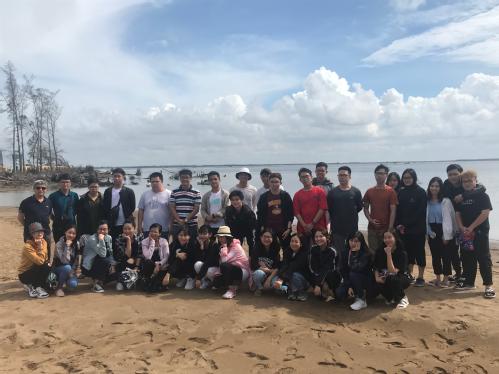News
Field trips in Vietnam
 Field trips incorporating problem based learning and community service enhance the learning experience of engineering students focusing on climate change at Ho Chi Minh University of Technology.
Field trips incorporating problem based learning and community service enhance the learning experience of engineering students focusing on climate change at Ho Chi Minh University of Technology.
As a pioneering university in international cooperation activities, Ho Chi Minh City University of Technology has been a partner of ENHANCE project since 2018. Under the framework of ENHANCE, the university has chosen two engineering fields, which are Port and Coastal Engineering and Environment and Natural Resources, to apply innovative elements in teaching methodology. Curriculum and student evaluation rubric are revised. Diverse components of teaching techniques, including group presentation, field trip, group discussion, community-based projects, etc. are added to raise students’ interest and engagement in class activities and encourage their lifelong learning.
The most interesting part of the courses is the field trip. Students had an opportunity to visit sites at local areas which helps strengthen their knowledge gained from theoretical sessions on climate-related risks, disaster, and impacts of climate change on a wide range of socio-economic sectors. In 2020, students from the course “Climate Change and Adaptation Measures”, Environmental and Natural Resources Management, conducted their trip to 3 coastal districts (Thanh Phu, Binh Dai and Ba Tri), Ben Tre Province in the Vietnamese Mekong Delta region. These areas are strongly influenced by consequences of global climate change. Students visited Ba Tri Lake, the biggest freshwater reservoir in Mekong Delta to discover its function in mitigating salinization. They also visited different sites to discover the situation of landslides and coastal erosion in Ben Tre Province. Additionally, they had a chance to talk to local people and explore the adaptation model: Planting (four season) mangoes using drip irrigation system. During the trip, students excitedly engaged themselves in visit activities. They improved their knowledge and experience on real environmental hazards in Mekong Delta. They also did their networking with their friends, which increased their teamwork efficiency.
Most importantly, students have experienced a project-based learning approach when participating the course. Before undertaking site visits, students are divided into small groups, and are required to make desktop reviews. Each group conducted screening documented literature and identified the local climate-related risks and disasters in the Vietnamese Mekong Delta region. Accordingly, student groups were given 15 minutes to present their interests/topics for further investigation during the fieldtrip/site visits. The performance of project-based learning outcomes are expected to present at the “1st International Conference on Humanitarian Engineering: Challenges and Approach” which will be held by West Attica University, Greece.